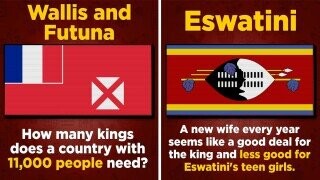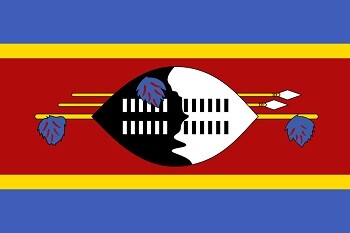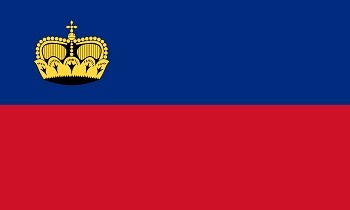6 Bonkers Monarchies ... That Are Still Around Today

The fact that monarchies continue to exist in the 21st century is just baffling. How is it possible for someone to own a smartphone yet still have to pledge fealty to some dude with a golden hat just because his ancestor planted a flag in their ancestor's vegetable garden? Fortunately, after centuries of constitutional changes and the occasional guillotining, most countries have reduced their kings and queens to expensive but impotent tourist attractions. Like pandas, but even more inbred. But not all royal subjects have the luxury of just ignoring the fact that they live in a feudal society. Their monarchies have remained as maddeningly and moronically Medieval as the day they were first founded. Places such as ...
The King Of Eswatini Gets To Pick A New Wife Every Year
As the guy who used to have to wipe the English king's ass on the toilet could tell you, monarchs get to enjoy some very unique privileges. But none are quite as gross and Entourage-y as those of the king of Eswatini, who still enforces his privilege of having more sidepieces than a 1,000 piece puzzle.

Never the most popular, the old royals of Eswatini had a bad habit of getting poisoned. To counteract this, these absolute rulers seemingly decided to out-breed the assassins, allowing the king one new wife for every year of his reign. This new bride is typically picked during the annual Umhlanga ceremony or Reed Dance. At the eight-day long pageant, thousands of young Eswatini women parade topless in reed skirts in a mandatory competition to see who will become the next Miss Concubine.
After the ceremony, the king has the option to pick one half-naked teen as his next "fiancee" with the promise of becoming a full wife if she manages to bear him a child. (Marriage is for closers). Through this process, the current King Mswati III has assembled a harem of fifteen wives. This includes an 18-year-old girl he had kidnapped without her family's knowledge. And those are rookie sex-slave numbers compared to his dad, king Subhuza II. Having been king for a whopping 83 years, Subhuza II holds the title of the longest-reigning monarch in history. As a result, he managed to collect 70 wives, 200-odd children, and well over 1,000 grandchildren.

But the over-sowing of royal oats may come to an end soon. More and more Eswawtinis demand democracy as they no longer believe King Mswati III has the people's best interests at hand. Part of that is because he's the only one who's allowed to be polygamous. Part of it is because he force-married a teen during a five-year-period when he forbade all Eswatini women from even touching a man in the hopes of curbing the AIDS pandemic. (It didn't, and the average lifespan in Eswatini is still only 34 wives). Part of it is because he tried to change the constitution in 2003 to give himself absolute power and ban all political parties. But mostly, it's because Mswati III is openly corrupt as hell. While Eswatinis are some of the poorest people in the world, he has earned hundreds of millions of dollars by cheating them out of land deals. But can you really blame the guy? He has so many mouths to feed.
The President Of France And A Spanish Bishop Co-Rule The Principality Of Andorra
Until the 1990s, the small nation of Andorra had no army, no police force, no schools, or even roads. What they did have was an overabundance of rulers. Because, unlike every other subject who has had to bend the knee in front of their one true king, the people of Andorra had two princes standing before them.

For over a century, the Principality of Andorra has been co-ruled by the Spanish Bishop of Urgell and the President of France. How did this strange tag team wind up princes of a tiny mountainous nation? During the 10th century, when Charlemagne fought back the Moorish invaders of Spain, the Andorran men of the mountain came to his aid. In return, the king made Andorra a sovereign principality under the nearby Count of Urgell's rule. So grateful were the Andorrans that most of their national anthem is still about how awesome Charlemagne is. That, and some very dated opinions about Muslims.
But that was the last time the Andorrans had any luck with foreign rulers. The counts of Urgell soon became bored with having to take care of Andorra. In 988, they traded the principality with their local Bishop in an epic bout of feudal swapsies. Needing an army to defend his new princedom, the Bishop of Urgell made a deal with the Lord of Caboet to enter into a partnership of co-rule or, as the French call it, pareage.

This royal co-parenting worked fine at first but eventually fell victim to a common feudal problem: a noble lineage as tangled as a pair of earbuds after spending five seconds in your pocket. By the seventeenth century, the direct descendant of the Spanish lord of Caboet was none other than the King of France, Henry IV. Luckily, impoverished Andorra wasn't worth the trouble of going to war over. (The only things the Andorrans cultivated were lichen and a deep hatred of anyone not from Andorra). Instead, a new Spanish-French pareage was established between the bishop of Urgell and the head of state of France -- whether they were kings, emperors, or presidents.

Aside from a short French occupation after they revolted by electing a Russian conman as their king, this arrangement changed nothing for the dirt poor Andorrans. That changed in 1993, when they finally threw off the yoke of co-oppression, established a constitution, and became a wealthy tax haven. Today, with a GDP of $3,2 billion, the lowest unemployment in the world, and the highest life expectancy, everybody can live like a prince in Andorra. Except for the actual princes, who are still only allowed to collect the same Medieval tax rate. $460 for the president while the bishop gets $12, six hams, six cheeses, and a dozen chickens.
Perak Has The Most Elaborate Rules Of Succession Ever Written
History is lousy with coups, civil wars, and revolutions that triggered because nobody could agree on who should sit on the throne while the seat was still warm. So if having a clear line of succession is the best security a sovereign can strive for, the Sultans of Perak have nothing to fear. After all, they have more backups than a neurotic I.T. engineer.
As an almost Darwinian response to centuries of succession wars and constant British and Chinese meddling, the Malaysian state of Perak has developed a fiddly but rigid code of succession to assure everyone knows their place. Established by the end of the 19th century by legendary Sultan Idris ibn Raja Iskandar, Perak has six special royal heirs selected from the three royal families. When a new Sultan arises, all the heirs move up a spot, and the ruler's oldest son is put in the back of the line. That way, every bloodline gets its turn on the throne.

While there's nothing special about having a clear line of succession (we all have that friend who took a DNA test and found out he's technically 762nd in line to the Portuguese throne), Perakian succession is less of a well-ordered queue than an anime-like hierarchy of power levels. Each prince or raja gets his own special privileges and, most importantly, a special title showing his rank. First up is crown prince Raja Muda (literally: "The Young King"). Then there's the immediate backup, the Raja di-Hilir or "Downstream King." He's followed by four Rajas Kecil or "Small Kings." First the Raja Kecil Besar or "Biggest Small King," then Raja Kecil Sulong or "Senior Small King," Raja Kecil Tengah or "Medium Small King" and finally Raja Kecil Bongsu or "Smallest Small King." Not that these titles are necessarily indicative of their meaning. The current "Smallest Small King" is in his seventies, while the "Biggest Small King" just finished elementary school.

But not even Perak's royal rota is foolproof at keeping out foreign influences or royal drama. 2016 saw the arrival at the court of the long lost Raja Keith y Glo ibni Almarhum Sultan Idris Shah. If that name sounds off, it's because Keith y Glo is Welsh for "Keith the Coal." Adopted by a Welsh coalman as a baby, Keith 'The Coal' Williams discovered in his '60s that his biological father was Idris Iskandar Al-Mutawakki, the 33rd Sultan of Perak. And bastard or not, as firstborn Keith has a right to be named one of the six successor princes of the current sultan. Luckily, the Perrygroes granddad has no intention of staking a claim for the sultanate, wisely avoiding a bloody war of succession between the warrior nations of Perak and Wales.
Wallis And Futuna Is A 54 Square Mile Country With Three Unstable Kingdoms
As anyone who's ever been cornered by an overzealous mall cop figures out, the slightest sliver of absolute power can turn people into petty tyrants. And no one knows that than the people of Wallis and Futuna, a minuscule island chain that has not one, not two, but three troublesome kings.

Having roughly the size, population, and GDP of a medium Delaware town, The French territorial islands of Wallis and Futuna are some of the most insignificant specs dotted on the Pacific Ocean. As such, its French prefect leaves most of the day-to-day business to the kings of its three kingdoms, Wallis, Alo, and Sigave, who each rule over a couple of thousand subsistence farmers. Their already minuscule influence is further subdivided among ministers, tribal chiefs, and the islands' many royal families who get to elect who becomes the next king of the molehill.
But while each monarch has roughly the amount of power of the head of a middle school PTA, they often wield that power with the same ruthless absolutism. Modern Wallis & Futuna kings have been known to fire their prime ministers on a whim, deny marriages, and demand that their subjects get off their bikes when riding past the palace. Recently, these antics have caused more political upheaval in the tiny islands than during most crusades. Between 2003 and 2016, each kingdom deposed several of its kings, reducing the average reign from decades to a couple of years. In 2005, the long-standing King Tomasi Kulimoetoke II even had to fend off an armed rebellion after he refused to turn over his grandson, who had drunk driven over one of his subjects.

Because of these constant political upheavals, the throne has often been left vacant for years on end (Sigave didn't have a recognized ruler for almost a decade). In 2016, this even led to Wallis having two rival kings, putting the total of four kings -- or about one for every square mile. While the ministerially appointed successor was being crowned elsewhere, angry Wallisians stormed the palace en masse (i.e., about 30 of them) and took control of the throne room, which allowed them to legally appoint a new king themselves.

As a consequence of all these political teacup storms, the kingdoms of Wallis and Futuna are shrinking by the year. Many young subjects flee in droves to nearby New Caledonia for a fresh, royalty-free start. Today, more than two-thirds of all Wallis and Futunans no longer live on the island, making it only a matter of time before there are more kings than subjects.
Liechtenstein's People Agreed To Become An Absolute Monarchy … In 2003
Being a monarch in Europe is having to watch your divine powers slowly be reduced by every Braveheart who doesn't like the cut of your primae noctis. Except for Liechtenstein's shrewd rulers, who somehow managed to convince their 21st-century subjects to drag the country back to the 15th.

The tiny principality of Liechtenstein is like the vanity plate of nations. In 1719, the domain was bought by the uber-wealthy Austrian Liechtenstein family just so they could call themselves princes. With no intention of actually ruling their new principality, the Liechtensteins left the country on autopilot for the next 200 years, doing the bare minimum for its economy (their biggest export was false teeth), its laws (women weren't allowed to vote until 1984), or its diplomacy (they gave Switzerland control of its borders because they couldn't be bothered guarding them). Yet nothing symbolizes their C-student attitude more than Liechtenstein's national anthem, which isn't just barely one minute long but also steals the melody of "God Save The Queen" while hoping that Britain wouldn't notice.
With that in mind, you'd think that the people of Liechtenstein would despise their deadbeat princes, who didn't even set foot in the country they named after themselves for the first 100 years and only moved there in 1938. Yet in 2003, two-thirds of the country voted to change the constitution to make Prince Hans-Adam II the only absolute monarch in all of Europe with the power to dissolve the government on a whim. Why? Because he threatened to leave the country -- that thing other countries had to burn down palaces for before their royals did likewise.
Why are modern Liechtensteiners so attached to their deadbeat rulers? Because they made them all filthy rich. During World War II, the Liechtensteins were thoroughly looted by both sides. Looking to their neglected nation for income, the very business-savvy royals took a page from their Swiss neighbors and transformed Liechtenstein into a libertarian tax haven. Its private banks took money from global corporations to (allegedly) Colombian drug lords, Russian gangs, and the Sicilian mafia.
Today, more companies call Liechtenstein home than actual people, netting the people of Liechtenstein the highest GDP per capita in the world, all because the Liechtensteins started running their country like a company. This includes overseeing much of the private banking and throwing an end-of-quarter party where the entire country is invited to come and drink a beer with their princely CEO. And so what if they had to sacrifice all of their autonomy and self-respect to keep serving at the whim of a billionaire megalomaniac. If Facebook employees can stand it, so can the people of Liechtenstein.
The British Monarchy Is Still The Weirdest In The World
Aside from the boilerplate allegations of assassinations, pedophile rings, and institutional racism, the royal house of Windsor is often seen as the Platonic ideal of a modern monarchy: quiet, dignified, absolutely toothless. But when it comes to dormant royal powers, Queen Elizabeth II doesn't just take the cake; she can make the Count of Dorchester balance it on his head until someone brings her a unicorn to eat.

Theoretically, the ruler of the United Kingdom still wields ridiculous (both in amount and specificity) powers over her domain. As the head of the British state, the Queen can still, for example, dissolve the entire Australian government whenever she feels like it. She also still has the power to single-handedly declare war on any nation and commandeer any British ship on a whim -- a power that was last used in 1982 when the Queen took control of a cruise ship (called Queen Elizabeth 2, no less) to ferry troops to Argentina during the Falklands War.
The Queen also remains the Beastmaster of the British Isles. At all times, she appoints a minimum of six ravens, all given the rank of actual British soldiers, to guard her crown in the Tower of London. Speaking of fowl feudalism, since the 12th Century, the British monarch also "retains the right to claim ownership of any unmarked mute swan swimming in open water." Anyone wanting to eat, stuff, or get rid of a dead swan must first ask the Queen for permission through her Royal Swan Marker. Not content to own anything majestic on the water, an obscure 1324 legislation means every sturgeon, whale, and porpoise within three miles of the British coastline automatically belongs to the Queen -- which might in part explain why no one can be bothered opening a dolphinarium in the UK.
And while tourists are so very charmed by all the island's rigid royal customs, most Britons are less into the fact that they can be dragged into some Medieval pageantry bullshit at the drop of a weird royal hat. Fortunately, most of these legal traditions are annoying at worst. Some British regions are required to "pay" a single rose directly to the queen for its people to maintain their land rights. Meanwhile, the Duke of Wellington has to pay the "rent" for his grounds by presenting the queen with a French flag.

W Heath and JC Stadler
If the Queen insisted on enforcing them, other obligations would be a royal pain in the ass. For example, when passing certain castles, the Queen can demand that the county provide her a fully armored knight as a bodyguard to escort her through their demesne, which these days would mean putting the nearest poet laureate in plate mail and telling them to go jog next to the royal Humvee. But no one has it worse than the owner of Fowlis Castle, whom the Queen can demand prove his loyalty by handing her a snowball. In the middle of summer.
These are just a small sample of the nigh endless royal privileges the British monarchy has quietly kept in its back pocket since the signing of the Magna Carta. Not that there's any reality in her enforcing these powers ever again, but it must be strange living in a country where, theoretically, your Queen can command you to put on chainmail, pick up a snowball, and report to the nearest raven commander because she's just declared a literal War of the Roses.
For more royal screwups, you can always follow Cedric on Twitter.
Top Image: Public Domain